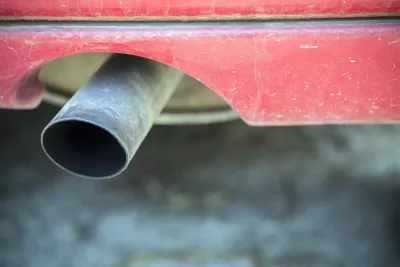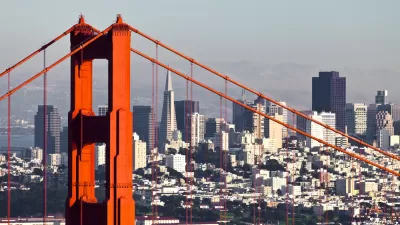Eying European and Asian countries that have set, or are considering timelines to ban sales of cars that emit greenhouse gases, the California governor asked his chief air regulator to see why California couldn't follow suit.

"California Gov. Jerry Brown has expressed interest in banning cars that burn fossil fuels, the state’s top climate change regulator said in an interview published Tuesday," reports David R. Baker, the San Francisco Chronicle's clean tech and energy reporter.
“The governor has certainly indicated an interest in why China can do this and not California,” Mary Nichols, chair of the California Air Resources Board [CARB], told Bloomberg News.
While China has yet to determine a timeline for banning gas and diesel-powered cars, others have already set dates, though not necessarily firm:
- Netherlands: 2025
- Norway: 2025
- India: 2030
- France: 2040
- Great Britain: 2040
A bill two years ago tackled oil consumption, requiring it to be reduced 50 percent by 2030, along with reducing natural gas consumption by power plants. The bill passed, but without the oil mandate, following a pattern reflected in CARB's June emissions inventory report which showed that while greenhouse gas emissions continue to decline overall, the exception is from transportation sources, which have been increasing.
Brown, arguably the foremost climate champion in the United States since President Obama left office, is driven not only be green envy but by legislation passed last year requiring greenhouse gas reduction of 40 percent below 1990 levels by 2030.
“Timing matters,” said Simon Mui, director of the California vehicles and fuels program at the Natural Resources Defense Council, an environmental group. “By 2050, the phaseout of combustion technologies is needed to meet our climate goals."
A bill that would have greatly increased funding for the state Clean Vehicle Rebate Project by "equalizing prices for electric and gas-powered compact cars" was unsuccessful, though a budget bill which will maintain the current funding for the program at $140 million was signed into law by Gov. Brown on Sept. 16.
FULL STORY: Could California ban gasoline cars?

Alabama: Trump Terminates Settlements for Black Communities Harmed By Raw Sewage
Trump deemed the landmark civil rights agreement “illegal DEI and environmental justice policy.”

Study: Maui’s Plan to Convert Vacation Rentals to Long-Term Housing Could Cause Nearly $1 Billion Economic Loss
The plan would reduce visitor accommodation by 25% resulting in 1,900 jobs lost.

Why Should We Subsidize Public Transportation?
Many public transit agencies face financial stress due to rising costs, declining fare revenue, and declining subsidies. Transit advocates must provide a strong business case for increasing public transit funding.

Paris Bike Boom Leads to Steep Drop in Air Pollution
The French city’s air quality has improved dramatically in the past 20 years, coinciding with a growth in cycling.

Why Housing Costs More to Build in California Than in Texas
Hard costs like labor and materials combined with ‘soft’ costs such as permitting make building in the San Francisco Bay Area almost three times as costly as in Texas cities.

San Diego County Sees a Rise in Urban Coyotes
San Diego County experiences a rise in urban coyotes, as sightings become prevalent throughout its urban neighbourhoods and surrounding areas.
Urban Design for Planners 1: Software Tools
This six-course series explores essential urban design concepts using open source software and equips planners with the tools they need to participate fully in the urban design process.
Planning for Universal Design
Learn the tools for implementing Universal Design in planning regulations.
Smith Gee Studio
Alamo Area Metropolitan Planning Organization
City of Santa Clarita
Institute for Housing and Urban Development Studies (IHS)
City of Grandview
Harvard GSD Executive Education
Toledo-Lucas County Plan Commissions
Salt Lake City
NYU Wagner Graduate School of Public Service





























